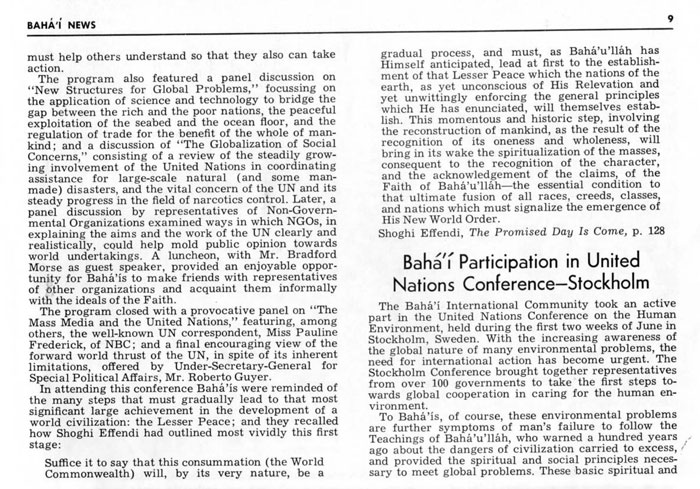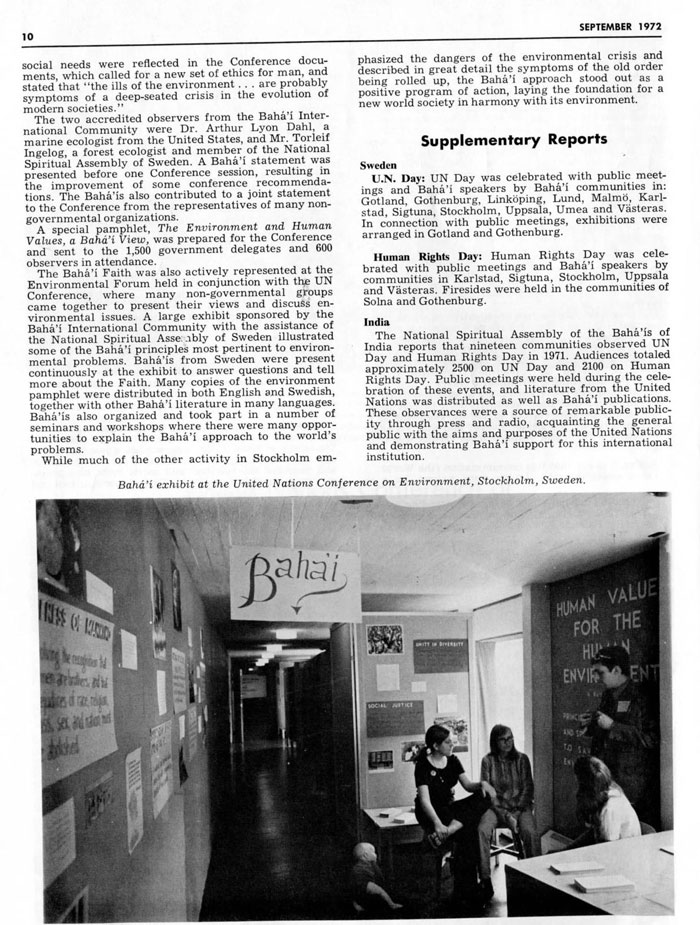Stockholm Conference 1972
Bahá'í participation in the
United Nations Conference on the Human Environment
Stockholm, Sweden, 5-16 June 1972
by Arthur Lyon Dahl
(based partly on notes taken at the time and on documents in the National Baha'i Archives, Wilmette, Illinois, USA)

Stockholm 1972
The United
Nations Conference on the Human Environment (UNCHE), in Stockholm, Sweden, 5-16 June 1972, with Maurice Strong as Secretary-General, was the first major UN conference to deal with the environment as a global issue. Concern about human impacts on the environment had been growing through the 1960s, with Rachel Carson’s book “Silent Spring” in 1962 warning of pesticide impacts on birds, the Torrey Canyon oil spill in 1967 and the Santa Barbara oil spill in 1969, among others. Growing public pressure pushed governments into action. This paper documents the participation of the Bahá’í International Community in this conference that launched the multilateral intergovernmental approach to the environment. As we approach its fiftieth anniversary in June 2022, still facing the environmental crises of climate change, biodiversity loss and planetary pollution among others, recalling how the process started can help us to plan for the further efforts required in the years ahead.
This was the first major UN conference where non-governmental organization (NGO) observers were accredited to contribute. There was, of course, already accreditation possible to the UN Office of Public Information (OPI), and then to the Economic and Social Council (ECOSOC), with the Bahá’í International Community (BIC) already accredited in 1948 to OPI and in 1970 to ECOSOC. This allowed the BIC to send two accredited observers to the Stockholm Conference: Dr. Arthur Lyon Dahl, an environmental scientist from the Smithsonian Institution in Washington, D.C., USA, and Torleif Ingelög, also a biologist and environmental specialist from the Royal College of Forestry in Sweden. The list of accredited NGO observers includes 29 representatives of 15 organizations, but there were about 600 observers in all, with about 135 from NGOs and others in delegations.
BIC Statement
Arthur had worked with Victor de Araujo of BIC New York to prepare a statement The Environment and Human Values: A Bahá’í View which was distributed as a pamphlet in both English and Swedish to all delegates, NGOs, and the press (about 3,000 copies).
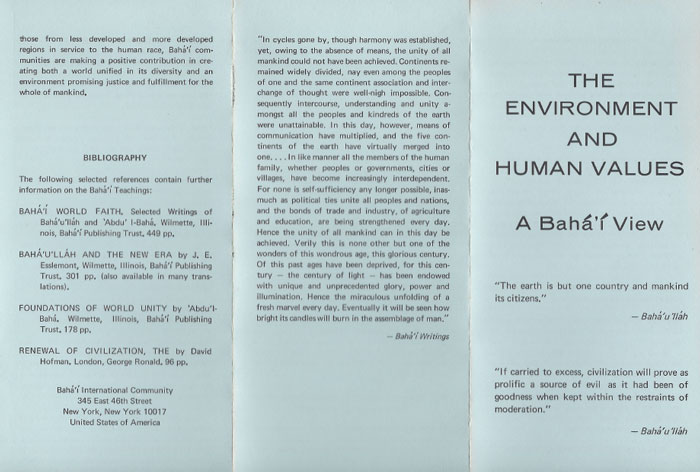
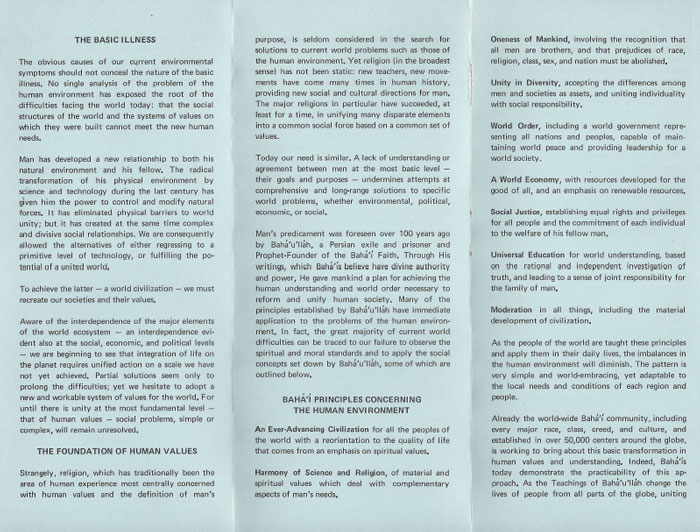 Bahá'í International Community statement
Bahá'í International Community statement This was accompanied by the following letter to delegates:
12 June 1972
To Delegates attending the U.N. Conference in Stockholm
Much has been accomplished and will continue to be achieved during the U.N. Conference on the Human Environment in dealing with specific environmental issues. However, one area of fundamental importance is not so readily subject to government action. The need for a new set of environmental ethics has been stated in the conference document on subject area IV (A/CONF.48/9, paragraphs 69-73), and repeatedly emphasized in the deliberations of the observers from non-governmental organizations and elsewhere in Stockholm.
The Baha’i International Community has long been concerned with the basic transformation in human values needed today. We therefore offer the enclosed statement as a contribution towards the discussion of a new environmental ethic for man.
Dr. Arthur Lyon Dahl
Torleif Ingelög
Accredited Observers from the
Baha’i International Community
After the conference, the BIC reprinted 5,000 copies of the pamphlet for further distribution.
Bahá’í Exhibit at the Environment Forum
Arthur Dahl arrived in Stockholm on 4 June, and that afternoon, with the help of local Baha’is, he set up a Baha'i exhibition in the Environment Forum for NGOs. He had prepared suitcase-sized panels with text and photographs that could be hung on a blue cloth background. The following is the proposal for the exhibit as submitted to the conference secretariat.
PROPOSALS TO THE ENVIRONMENTAL FORUM FROM THE BAHA’I INTERNATIONAL COMMUNITY (23 March 1972)
The human environment in its many aspects has long been a concern of the Baha’i International Community, with its unique global perspective on the problems of today. There are three general themes appropriate to Baha’i principles and concerns that we particularly recommend for inclusion in the Environmental Forum:
• Human values, rights and responsibilities as they relate to the human environment, with particular reference to the role of religion and moral education.
• Environment and development, particularly social and environmental values in the developing world, and the need to reconcile the problems of over- and underdeveloped nations.
• The global crisis and patterns of world order, including the place of environmental problems in the broader perspective of the need for world attitudes and institutions.
Specific program proposals follow.
EXHIBIT
Theme: World Values for a Human Environment
This exhibit, sponsored by the Baha’i International Community, will present some of the basic human values necessary for the establishment of a global society in harmony with itself and its environment. Some of the themes to be emphasized through graphic displays, quotations from the Baha’i writings, and literature for distribution include:
• Justice, with its applications in the golden rule and the abolition of extremes of poverty and wealth;
• Moderation, including the dangers of material civilization carried to excess;
• An ever-advancing civilization, with a reorientation to the quality of life that comes from an emphasis on spiritual values;
• Harmony of science and religion, of material and spiritual civilization;
• Need for a world economy, with resources developed for the good of all, and an emphasis on renewable resources;
• Oneness of mankind and the need for world institutions and world peace;
• Unity in diversity, applied to regions, societies and all mankind; and
• Education for world order, and a sense of responsibility for the human family.
Arrangements will be made for Baha’i representatives to be at the exhibit.
PROGRAM ON ENVIRONMENT AND DEVELOPMENT
One of the major unresolved issues in the current concern for the environment is the need to harmonize world ecological requirements with the pressing requirements for social and material development in many nations. The Baha’i International Community recommends that this be made a major program theme for the Environmental Forum, drawing on the great diversity of viewpoints represented at the Stockholm Conference. It is important, however, that the program concentrate on the unity underlying the diversity of needs and approaches, and not just present the “haves” vs. the “have-nots”. The goal of all this is the development of a stable world society with universal opportunities for human happiness and fulfillment; we should be seeking together for creative ways of meeting this common aspiration.
Baha’i representatives with be available to present the world perspective of the Baha’i community on this problem of global harmony, and to discuss specific examples of the problems and the required solutions. Dr. Arthur L. Dahl, Baha’i delegate to the U.N. Conference can, if desired, present an illustrated lecture on Environment and Development in Samoa, as a case study.
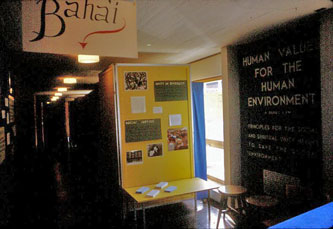 .
. 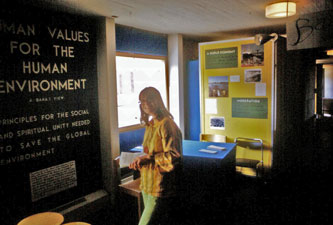
Bahá'í exhibit at the NGO Environment Forum
The Swedish Bahá’í community helped to man the booth in the Environment Forum. Lars Nyquist was the coordinator, and others who served included Mrs. Mehry Afsahi, Miss May Afsahi, Miss Behnaz Golmohammad, Miss Melinda Alpaugh (USA), Mr. Magnus Borud, Mr. Jan Holmbring, Miss Lena Ingelman, Miss Inger Janson, Miss Lena Johansson, Mr. Ake Johansson, Mr. Bengt Löthgren, Mrs. Fruz Malekzadeh, Mr. Paul Mukasa (Uganda), Miss Ane Sodergaard (Danish), Mr. Bent Tholstrup, Mr. Bahador Tofighian, Mr. Leif Wallen, and Mr. Roger Westergren. The delegation also met Paul Ojermark, NSA Secretary. There was a meeting with Willy Willoya (Alaska) and other Baha'is on 6 June.
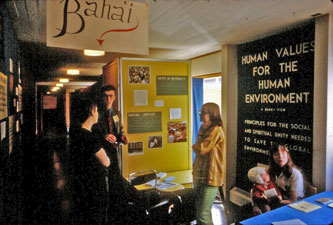 .
. 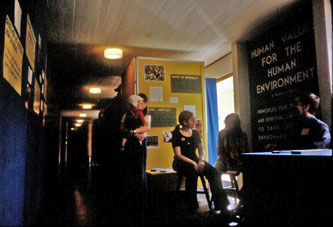
Bahá'í exhibit at the NGO Environment Forum
From the exhibit were distributed the environmental pamphlet in English (1700) and Swedish (2450), as well as other English pamphlets from BIC (800), and in Finnish, German, French, Spanish and Japanese (320).
BIC participation in the UN Conference
The United Nations Conference on the Environment was held in the Folkets Hus in the center of Stockholm. It adopted a series of principles for sound management of the environment including the Stockholm
Declaration and Action Plan for the Human Environment and several resolutions. The Stockholm Declaration contained 26 principles that placed environmental issues at the forefront of international concerns and marked the start of a dialogue between industrialized and developing countries on the link between economic growth, the pollution of the air, water, and oceans, and the well-being of people around the world. The Action Plan contained 109 recommendations in three main categories: a) Global Environmental Assessment Programme (Earthwatch); b) Environmental management activities; and (c) International measures to support assessment and management activities carried out at the national and international levels. One of the major results of the Stockholm conference was the creation of the United Nations Environment Programme (UNEP).
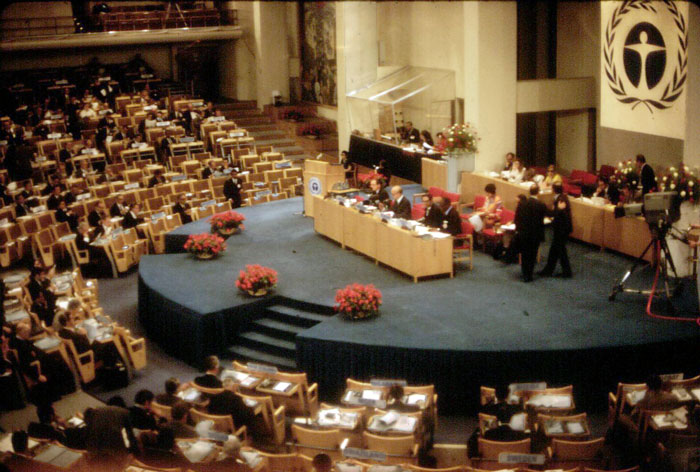
Stockholm Conference
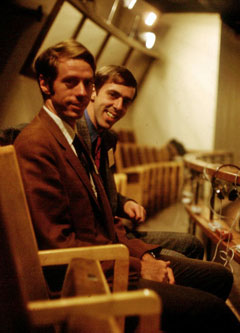
BIC delegation Arthur Dahl and Torlief Ingelög
While there were several hundred NGOs in Stockholm marching in the streets and exhibiting in the NGO Environment Forum at a school near the conference site, only some were officially accredited as observers to the conference itself, including BIC. The rule was that an NGO observer could submit a request to speak to the chairman of the session, but it was up to the chairman to decide if and when an NGO representative would be invited to speak. One could not know in advance where the conference would be in its agenda, and therefore on what subject one could make a relevant statement, so improvisation was necessary.
On 5 June and every day thereafter there was an NGO briefing at 8:30 in the morning. The conference opened at 15:00 in Folkets Hus conference centre, followed by a reception at the Nordic Museum in the evening. On 6 June Arthur attended Committee 1 from 10 to 13:00 and 15 to 18:00 (where his attempt to make a statement was not successful), followed by a workshop on ethics and the environment, and a meeting with Willy Willoya and other Baha'is in the evening.
On 7 June there were again morning and afternoon committee sessions. The chairman of committee 1 noted for the record that this was a conference of governments and the NGOs had their own events in the city, for which the delegates indicated their interest and support. A workshop at 14:00 was on strategies for optimal survival, and at a briefing at the Cathedral with Lady Barbara Jackson and René Dubos. who had written the background book for the Conference, Only One Earth, Dubos said that we do not reach the public, just talk to each other, and often antagonize. Lady Jackson spoke on global responsibility and education for world justice. She said social action was lacking and we were now retreating. They were working on a statement to governments on NGO input to the new agency. After another workshop at 18:00 there was a reception at the City Hall.
On 8 June, there was a workshop meeting in the Press Room at noon, and a panel at 14:00 at the NGO Forum on attitudes and values where Bahá’í was mentioned. A workshop on religion at 18:00 was followed in the evening by a Bahá’í fireside in Stockholm. A workshop group on religion and ethics at the NGO Environment Forum led by Arthur Dahl continued through the Forum and submitted its report on 13 June (report and list of participants available in the archives).
9 June started with a meeting of the religious group in the morning. After submitting requests over several days, it was in Committee 1 chaired by Imelda Marcos of the Philippines, the wife of the President, on 9 June at 13:00, that the chair announced that the next speaker was from the Bahá’í International Community. On hearing this announcement, the delegates of Iraq and Egypt got up and left the room. Arthur wondered what the reaction of the Iranian delegation would be. The following is the text that Arthur presented.
STATEMENT PRESENTED TO COMMITTEE I, UNITED NATIONS CONFERENCE ON THE HUMAN ENVIRONMENT, BY DR. ARTHUR L. DAHL, ACCREDITED OBSERVER FOR THE BAHA’I INTERNATIONAL COMMUNITY, JUNE 9, 1972.
Madam Chairman,
May I speak briefly on the portion of subject area IV on which committee action has not yet been completed.
The Baha’i International Community, representing national Baha’i organizations in over 100 countries, wishes to point out that many environmental problems have at their root the lack of adequate human values and motivations for environmental and human improvement, as discussed so well in sections 67 to 73 of the document on subject area IV.
We note, however, that no specific action has been proposed to implement the necessary changes in this area beyond assistance to general education. Religion has traditionally been concerned with defining and teaching human values, and many non-governmental organizations, such as the religious organizations, have institutions and personnel with expertise in influencing human values that may be able to play an important role in bringing about the changes needed today.
The Baha’i International Community would like to urge, therefore, that the sense of the recommendations in subject area IV on education and particularly public information be broadened to refer to the provision of information not only to states, but also to non-governmental organizations, because of their importance in influencing the beliefs and motivation of their memberships.
Thank you for the opportunity to present our view.
After he sat down, a note was passed back to him from the Iranian delegation. It read “Bahá’í greetings, Shapour Rassekh”. At that time he was the Deputy Minister for Planning in the Iranian government and part of their delegation to the conference. They met afterwards, and he said he was surprised and pleased that the Bahá’ís had contributed directly to the conference. In the afternoon at 15:00, the U.S. delegation met with U.S. NGOs at the Sheraton about a possible meeting of NGOs in Washington in September. There was the usual 18:00 workshop, and a 19-day Feast in the evening.
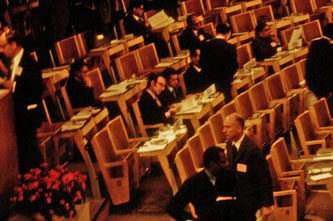
Shapour Rassekh, Iranian delegate (centre)
To follow up the BIC statement, Torlief went to the Swedish delegation to see if some text reflecting our statement could be included in the conference outcome, which was done. Recommendation 97 1(a) on an information programme, calls for “eliciting interest and contributions from non-governmental organizations.” Under IV CO-ORDINATION, paragraph 18 invites “those non-governmental organizations which have an interest in the field of the environment to lend their full support and collaboration to the United Nations with a view to achieving the largest possible degree of co-operation and co-ordination.” Thus the Bahá’ís had a small but direct role in opening United Nations events to non-governmental organization contributions.
On Saturday 10 June, the NGO briefing ran through the morning to work on the NGO declaration draft, with another NGO meeting at 15:00. The declaration was reviewed on Sunday evening.
Monday 12 June at 15:00 a Plenary was held where the Joint NGO statement was presented by Margaret Mead. There was the usual 18:00 workshop as well.
On 13 June the Religious Task Force met at the Stuerkirke. It included Owen Owens, Al Cohen (UMC campus ministry), Karl Hertz (Lutheran), Norm …, Lawrence Stell, JoB, Kathy Conner (Presbyterian), Francis and Helen Line (Christian Films), Dallas Krung (English ministers, Stockholm), George Sody, and Arthur Dahl [names approximate]. Among the points raised: go from local issues to global perspective; lay people are more interested in environment than clergy; discussion on information for citizen christians; Dutch sugar beets; practical programs; national denominational. 1. Structure, 2. Identity, uniqueness, 3. Socio-structural analysis, ecojustice. Problem of sovereignty in religious denominations; ecology – church action groups; ecumenipause – not active now; alternative visions of the future.
On 14 June at 10:00 Arthur spoke in a seminar on Attitudes and Values for an action program. The NGO committee met at 13:00 and received the workshop results at 14:00. Dinner was before the 18:00 seminar. In the evening there was a Baha'i meeting at the Stockholm Hazira with Dr. Rassekh and Dr. Grossmann.
The morning NGO briefing on 15 June was followed by reports of the workshops at the Forum, an NGO Plenary at 13:00, and a late afternoon workshop.
16 June saw the closing Plenaries at 10:00 and 15:00, while Arthur visited the Forum in between. In the evening there was a meeting at the Ingelög's with all the Baha'is who helped with the exhibit to thank them for their contribution. Arthur Dahl departed Stockholm on 17 June for travel-teaching in Norway, Sweden and Finland.
Article for Bahá’í News
After the conference, Arthur prepared the following article for Bahá’í
News.
Report on the UN Conference on the Human Environment
Shortly after the conference, Arthur Dahl submitted to the Baha’i International Community the following report on the conference and its significance.
Report on the United Nations Conference on the Human Environment
Stockholm, Sweden 5-16 June 1972
By: Arthur Lyon Dahl
Accredited Observer
The United Nations Conference on the Human Environment, held in Stockholm in June 1972, represents the first major step towards broad international agreement and cooperation in the protection and management of the biosphere. That it was held at all was highly significant. Only the more developed nations were involved at first in concern for the global environment but as the conference preparations proceeded the great majority of countries became increasingly aware of their ecological interdependence and of the local manifestations of environmental imbalance. Thus a major goal of the conference, the focusing of world attention on environmental problems, was largely achieved even before the program began.
In order to evaluate the conference and its results, it is necessary to view it in the broader perspectives of international relations and organization. The conference was basically a conference of governments, called together to consult on the major international problems of the human environment. Its deliberations carry no standing in international law, but represent statements of international consensus. Its primary function, therefore, was to focus the attention of governments on environmental issues, to identify areas where agreement and action were possible, and to suggest mechanisms for continued international action on environmental problems.
It is significant that the environmental conference was the first major U.N. activity which resulted in large measure from the pressure of public opinion, at least in certain countries. A vast number of observers were present from the press and non-governmental organizations, and the proliferation of subsidiary conferences in Stockholm provided additional demonstrations of widespread public concern.
Even the universal interest in environmental issues could not prevent political issues from seriously affecting the conference, including the exclusion of East Germany and the resulting boycott by Russia and most eastern European countries. The difficulty in separating the environment from politics was also apparent in the discussion of such issues as the Vietnam war and the atomic weapons tests of France and China. At a more fundamental level was the question of national sovereignty versus the needs and obligations attendant on the world nature of many environmental problems, a conflict repeatedly in evidence throughout the conference.
Three main types of action were taken in Stockholm. A declaration of international principles concerning the human environment was adopted, but only after seriously weakening some statements and entirely dropping others. This was perhaps the most publicized and least significant act of the conference. Numerous specific action proposals were also adopted, often after considerable debate, dealing with many international aspects of environmental issues. The discussion on these topics demonstrated the widespread governmental awareness of the need for international coordination and action, and frequently resulted in the strengthening of the proposals first placed before the conference. Finally, and perhaps most important, agreement was reached on a new environmental body within the U.N. system, thus providing a mechanism for translating the words agreed upon in Stockholm into actions benefiting the world community.
A number of issues discussed in Stockholm deserve special mention because of their great significance. Foremost among these is the relationship between environmental concerns and economic development. Many developing nations had originally viewed the environment as another excuse for preventing their development, but as preparations for the conference proceeded it became obvious that environmental problems were equally apparent in developing regions. Indeed, there appeared to be two kinds of environmental problems: those resulting from economic development and those caused by a lack of adequate development, the twin pollutions of poverty and wealth. With this recognition came the agreement on the principle of additionality and a variety of subsidiary resolutions, in which it was recognized that environmental concerns should not block development, although they might require that development take new forms, and that the additional costs of this environmentally-harmonious development should be provided by additional flows of aid from the wealthy countries. Herein lies a basic weakness incorporated in the results of the conference. Most of the actions agreed upon will require considerable financial support or flows of aid, funds the wealthy countries do not appear willing to provide in the necessary amounts. Some disillusionment with the results at Stockholm is therefore inevitable as the actions fail to live up to the initial promises. While the wealthy countries often voted against resolutions they were unwilling to support financially, the majority of poorer nations prevailed; only a system of international taxation, not yet even on the horizon, could resolve this dilemma.
Other significant areas of discussion and action included plans for a global monitoring network and international standards for pollution levels, agreement on the need to preserve the world’s genetic resources, proposals for better information exchange and increased technical assistance, and principles for research and planning in the improvement of human habitations.
One area of fundamental importance concerned the educational, informational, social and cultural aspects of the environment. The working papers for the conference pointed out that the environmental problems of today are symptoms of an underlying illness affecting all the societies of the world, and that at the most fundamental level, only a new set of human values and environmental ethics would permit more than temporary solutions to these problems. The conference resolutions recognized that programs of education and public information by both governments and non-governmental organizations would be necessary to make even a beginning in this direction.
In evaluating the results of the Stockholm conference, it is important to recognize that, although largely successful in achieving its aims, it was only the first step towards an international program of action on the human environment. It is now up to the governments of the world, the intergovernmental organizations and the new environmental secretariat to carry out the agreements arrived at in Stockholm. This will be a most difficult task, and the possibilities of failure are great. There are in addition many environmental issues barely considered or entirely avoided in Stockholm such as the population problem and the control of ocean resources, which must necessarily be dealt with before a true solution to the problems of the human environment is possible.
The Stockholm conference was a conference of governments, but many aspects of the environment are beyond the control of governments. The governments of the world were moved to cooperation in part by public opinion, and continued public interest and pressure are essential if the conference is to bear fruit. In those areas in which governments have only a small role to play, such as the realm of human values, the ultimate responsibility falls on each individual to examine his own life and to ask how he must change his goals and habits in order to contribute to a truly human environment for man.



 .
. 
 .
. 



